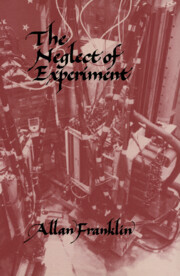Book contents
- Frontmatter
- Contents
- Acknowledgments
- List of abbreviations
- Introduction
- 1 The discovery of parity nonconservation
- 2 The nondiscovery of parity nonconservation
- 3 CP or not CP
- 4 The role of experiment
- 5 Do experiments tell us about the world?
- 6 The epistemology of experiment
- 7 The epistemology of experiment: case studies
- 8 Forging, cooking, trimming, and riding on the bandwagon: fraud in science
- Conclusion
- Notes
- Index
8 - Forging, cooking, trimming, and riding on the bandwagon: fraud in science
Published online by Cambridge University Press: 15 December 2009
- Frontmatter
- Contents
- Acknowledgments
- List of abbreviations
- Introduction
- 1 The discovery of parity nonconservation
- 2 The nondiscovery of parity nonconservation
- 3 CP or not CP
- 4 The role of experiment
- 5 Do experiments tell us about the world?
- 6 The epistemology of experiment
- 7 The epistemology of experiment: case studies
- 8 Forging, cooking, trimming, and riding on the bandwagon: fraud in science
- Conclusion
- Notes
- Index
Summary
Another possible problem concerning the role of experiment in physics is that of scientific fraud. Accusations of fraud have recently received considerable publicity in both the scientific literature and popular literature. Such accusations have raised serious questions concerning science policy and the funding of research, and several United States congressional committees have held hearings on the subject.
More important for the philosophy of science, and science itself, are the doubts such accusations raise concerning the reliability of experimental data. If a large majority of scientists do not subscribe to Merton's norm of “disinterestedness,” the honest reporting of experimental results, then science may be faced with an insoluble problem. Which experimental claims are to be believed – those that report a result or those that contradict it? Merton stated that “The virtual absence of fraud in the annals of science, … appears exceptional when compared with the record of other spheres of activity…,” but the accusations mentioned earlier may cast doubt on that assertion. Although no significant data on the prevalence of scientific fraud currently exist, Golley has expressed the view that these rather sensational cases are but “the tip of an iceberg.”
The question at issue here, however, is whether or not the normal procedures of science provide sufficient safeguards against fraud. It seems clear that some safeguards were operating in the cases noted earlier, because the fraud (or alleged fraud) was disclosed. In this chapter I shall examine four cases from the history of physics, involving not only possible fraud but also questionable analysis of data, to see if the existing procedures did work, and, if so, why.
- Type
- Chapter
- Information
- The Neglect of Experiment , pp. 226 - 243Publisher: Cambridge University PressPrint publication year: 1986



